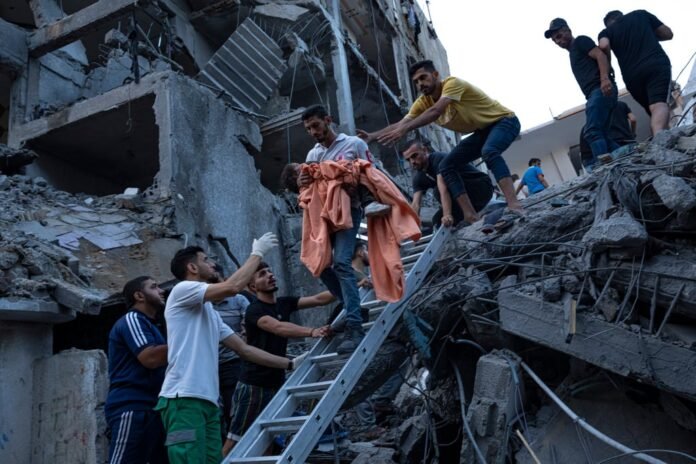In one of the deadliest incidents involving first responders in Gaza, 15 Palestinian paramedics and rescue workers were killed by Israeli forces and their bodies dumped into a bulldozed pit outside Rafah, according to eyewitnesses and family accounts. The killings, which occurred in the early hours of 23 March, have shocked relatives and raised grave concerns about the targeting of humanitarian personnel amid ongoing conflict.
A Dangerous Mission Ends in Tragedy
The risks of operating in Gaza have always been high for civilians. But for first responders like Saleh Moamer, the dangers were compounded as they raced toward the aftermath of bombings to save lives. Saleh, a 45-year-old Red Crescent ambulance officer, had previously survived two attacks while on duty. He was wounded in both incidents but returned to work each time, believing his mission outweighed the risks.
On the night of 22 March, he bought supplies for his wife, six children, and two nieces who had lost their father in the war — an act his brother Bilal now interprets as a forewarning.
“It was as if he had a feeling he would not return,” Bilal said.
The Final Rescue
Saleh’s final call to action came after an Israeli airstrike in the Tel al-Sultan area of Rafah. After dropping off a group of wounded, he returned to look for missing colleagues from another ambulance, including driver Mustafa Khafaja and paramedic Ezz al-Din Shatt. That vehicle had come under heavy fire, and the two men were killed. A third man, Munther Abed, survived but was detained by Israeli soldiers, whom he identified as special forces.
Determined to rescue his colleagues, Saleh returned to the site with a convoy of 13 Red Crescent and civil defence personnel. That was the last time any of them were seen alive.
Mass Grave Discovery
Abed later recounted seeing the convoy ambushed and its members detained and shot. A military digger reportedly threw their vehicles into a pit, which was then covered with sand. For a week, families waited in agony before the bodies were discovered and recovered.
READ MORE: Trump’s Tariff Gambit: Economic Strategy or AI-Fueled Folly?
“When the bodies arrived, they were wrapped in white shrouds with their names written on them. I uncovered my brother’s face myself,” Bilal said. “There were marks from restraints on Saleh’s wrists. His fingers were broken.”
Other eyewitnesses also confirmed signs of binding on the victims’ limbs.
Israel’s Response and the Families’ Grief
The Israeli military issued a statement saying the troops had fired on vehicles “advancing suspiciously toward IDF troops without headlights or emergency signals” and alleged, without evidence, that the ambulances were being used by militants.
For Bilal, the claim was outrageous.
“These paramedics were providing humanitarian services. They did not pose any threat or carry weapons. What was their crime for them to be killed like this?” he said.
More Families Devastated
Sobhi Bahloul, 63, also lost his son Mohammad, a volunteer paramedic with the Red Crescent. When he saw his son’s body at Nasser hospital in Khan Younis, he went into shock.
“The gunshot wounds were clear – shots to the chest and his wrist,” he said. “It looked like he had raised his hand to shield himself. I believe he died instantly.”
Mohammad, who trained as a nurse and had volunteered since 2018, was studying health administration while working unpaid as a paramedic. His dedication never wavered.
“He was courageous and proactive, never waiting for instructions – always taking the initiative,” Sobhi said.
Calls for Accountability
The Red Crescent has confirmed the identities of the 15 victims and demanded accountability for what it calls a “massacre of humanitarian workers.”
Humanitarian organizations and international legal experts are urging independent investigations, warning that the killing of medical personnel in a conflict zone could constitute a war crime.
For now, families like Bilal and Sobhi are left with grief, unanswered questions, and a growing sense of injustice.
“They went to save lives,” Sobhi said, “only to become victims themselves.”
